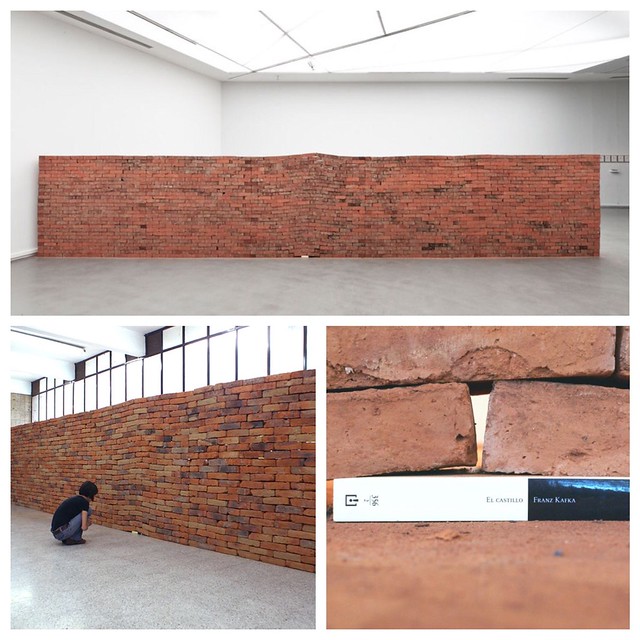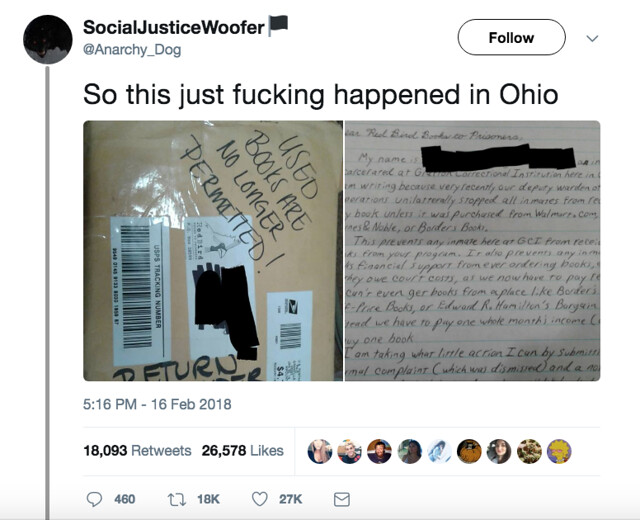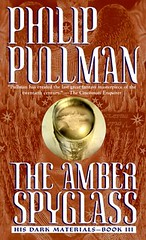You Can’t Read That! is a periodic column featuring banned book reviews and news roundups.

YCRT! News
The N-word strikes again: Harper Lee and Mark Twain pulled from Minnesota classrooms. Does this mean Duluth students will be left to read lesser literature?
In Missouri, “… a significant uptick in efforts to outlaw books following the 2016 presidential election.” More here.
On the plus side, a proposed Missouri law may shield student journalists from school-imposed censorship.
Ain’t no right to read in prison:

Citizens of Orange City, Iowa, accuse public libraries of “pushing an agenda,” want to remove books with LGBTQ content from the shelves. Some call for an outright ban; some call for labeling and restricting LGBTQ material.
“[I]nterference with internet traffic, favoring some sources and limiting others, impedes the free flow of information and profoundly disrupts both the right of individuals to participate in public discourse, and the full functioning of a library.” ALA statement on net neutrality as an intellection freedom issue.
In Wyoming, Cody High School has removed “A Bad Boy Can be Good for a Girl” from the library. “Trustee Scott Weber, who read the book and referred to it as ‘trashy,’ said the board should be prepared for parents to come forward soon with more library books they deem inappropriate for students. ‘There’s more to come,’ he said.” Note to self: future YCRT! banned book review.
Not the Onion, as they say: China bans George Orwell’s “Animal Farm” (and the letter “N”). “Animal Farm” I get; as for the letter “N,” they say it can be taken as a form of dissent. Normally I’d laugh, but I keep hearing rumors copies of “The Emperor’s New Clothes” are disappearing from U.S. book stores and libraries, and there’s talk of shutting down FM radio stations because “FM” can be taken as an abbreviation of “fucking moron.”
Apparently it is now against the law in Canada, if you work in government, to discriminate against transgender persons by referring to them with gendered pronouns. I have some thoughts of my own on that; you can probably guess what they are.
The emboldening continues:
With the movie adaptation of Madeleine L’Engle’s novel “A Wrinkle in Time” in theaters, journalists are reminding us of the reasons the famous young adult novel is frequently challenged and sometimes banned. Here’s a line from my own banned book review, written nine years ago: “So why is it that L’Engle’s book is so often challenged? Because, I suppose, a certain kind of Christian hates being reminded that Christ preached love over vengeance and hate. And then there’s the passage where L’Engle gives Ghandi equal billing with Jesus. Hell, I could have told her that was a non-starter.”
Until recently, my banned book newsfeed contained weekly references to Sherman Alexie and his famous novel “The Absolutely True Diary of a Part Time Indian.” Suddenly it’s as if Sherman Alexie never existed. Now I know why. Damnit, Sherman!
YCRT! Banned Book Review
 The Amber Spyglass (His Dark Materials, #3)
The Amber Spyglass (His Dark Materials, #3)
by Philip Pullman
I recently read the first installment of “The Book of Dust,” a new Philip Pullman trilogy, and afterward decided to re-read Pullman’s earlier trilogy, “His Dark Materials.” I have now finished the last of those three, “The Amber Spyglass.” The first time I read them, I had not yet begun reviewing books on Goodreads or my blog, so these reviews are new, and concentrate on their status as challenged and banned books.
Pullman published the “His Dark Materials” trilogy in the 1990s, and the books quickly became the subject of challenges and bans, primarily in schools but in some cases bookstores and public libraries as well. Objections to the books centered around a perceived anti-religion theme, as well as the author’s professed atheism. Since the books were written for a younger audience, they were seen as subversive. I was surprised to learn that the entire trilogy still appears on the American Library Association’s 2016 list of the top 100 banned and challenged books (a fact that suggests the new trilogy will join the first on future ALA top 100 lists).
I mentioned in my review of the second “His Dark Materials” novel, “The Subtle Knife,” that parents sometimes object to the darkness of young adult fiction, and that darkness may have been an unspoken reason for some of the opposition to these books, beyond the open opposition to their anti-religion theme and the author’s atheism. I must say, “The Amber Spyglass” is dark indeed, as dark as anything in classical literature.
Here, in the last novel, the anti-religion theme comes to a head with a final battle between the first angel and his forces and Lord Asriel and his, but really between the first angel and the child protagonists, who are fulfilling a strange destiny, unknown to them and only vaguely known to prophets. And there is, thank God, light at the end of their long, dark, twisted journey.
You notice I referenced God. The books are anti-religion. I never thought they were anti-God. In fact, and this is not meant as a spoiler, “His Dark Materials” ends with the creation of a new Heaven, a Heaven on Earth.
This will seem a bit of a detour, but the Harry Potter saga wore me out as the story reached the drawn-out climax of the war between Harry and Lord Voldemort. It was just too bloody much. Not only that, the story became ever more fantastical, and really the only thing that kept me going was my affection for Harry and his band of close friends.
That’s how I feel about the second two volumes of “His Dark Materials,” “The Subtle Knife” and “The Amber Spyglass.” My affection for Lyra is what kept me going; indeed, that affection is what draws me to the new trilogy, and I can’t wait for Pullman to write and publish the rest of it. That he can create such a character is his particular genius.
One last observation: although the books are categorized as young adult science fiction and fantasy, I want to point out that I am now in my 70s, and that I find myself profoundly affected by them, maybe even more so on a second reading. I can only imagine what their impact might be on teenaged readers. It must be profound indeed. Parents and authority figures who don’t want children to question what they’re told must be mighty nervous about books like these. Subversive? Boy, are they ever!
As usual, I cross-posted this to the Readers & Book Lovers group at Daily Kos, where an alert reader jumped in my shit for misspelling Ghandi and I have now resolved to deliberately misspell it for the rest of my life.